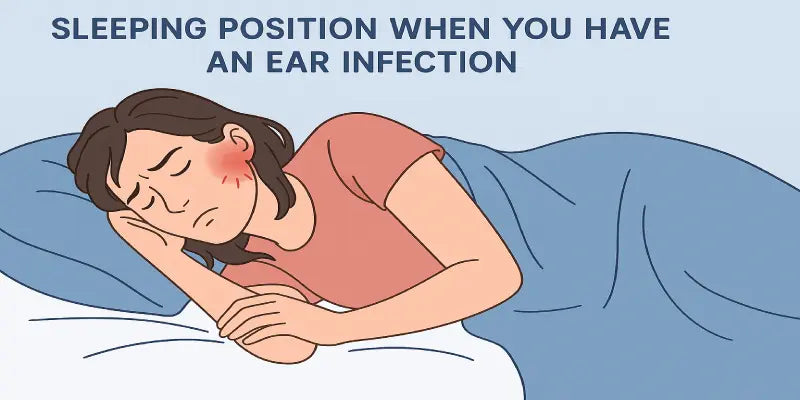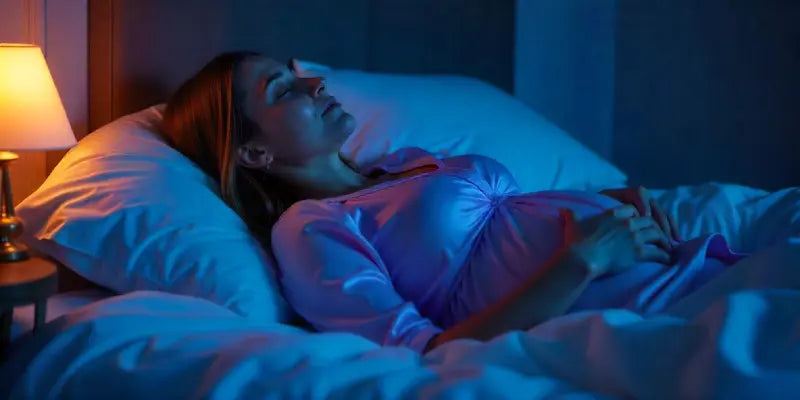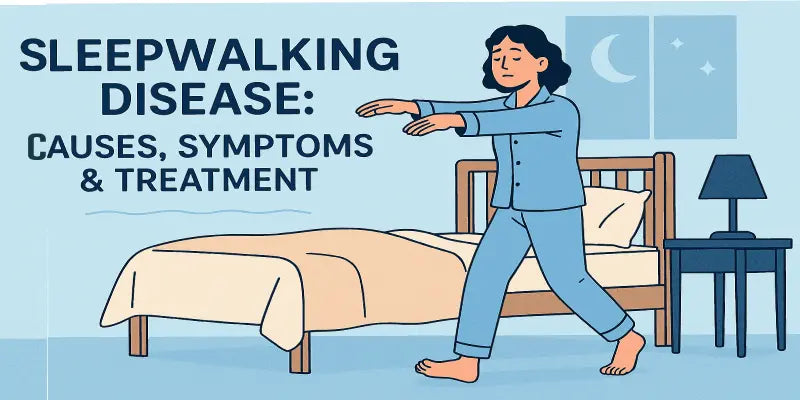
Vivid Dreams: Meaning, Causes, Effects and How to Stop Them
Most vivid dreams present themselves with clear themes and strong emotional energy which leads to a genuine feeling of reality. People report experiencing dreams that seem extremely authentic. Tastes, colors, sensations, and other experiences form an integral part of vivid dreams making them unforgettable.
But what do vivid dreams every night mean?
It indicates that something deep resides in your heart or mind. Being aware of the key reasons that trigger vivid dreams allows better distinction between unique and common dream experiences.
This guide explores vivid dreams, their origins, and side effects, and provides solutions for effective treatments.
What are Vivid Dreams?
Most people fail to recall their dreams once awake. In other scenarios, people retain detailed memory of their dreams, since they are extreme. Such dreams are called Vivid Dreams.

Vivid dreams meaning, according to sleep specialists, refer to dreams that can easily be remembered upon waking. The majority of dreaming is observed during the REM (Rapid Eye Movement) sleep, compared to all the stages of a sleep cycle.
REM sleep extends over a longer time period and continues for an hour in the final stages of sleep. Consequently, the possibility of vivid dreams every night increases significantly. However, if you wake up immediately or during the dream, recalling the dream is not possible.
What are the Triggers of Vivid Dreaming?
To tackle the impact of vivid dreaming, it is crucial to learn about its causes. Here is the list of reasons that trigger vivid dreaming among people:
Lack of Sleep
Sleep deprivation compels the body to end the REM mode frequently with increased intensity, elevating the vivid dream frequency.
Interrupted Sleep
Disturbed sleep patterns elevate the frequency of vivid dreams significantly. Crying infants, snoring bed companions, or clinical disorders like Sleep Apnea are the key reasons for interrupted sleep.
Emotional Tension
Cortisol levels shoot up with an increase in stress or emotional tension, leading to more episodes of dream recall. High-stress periods increase the possibility of nightmares.
Grief
People who suffer or mourn the loss of a loved one often dream about them eventually. The grieving process often triggers vivid dreams.
Emotional Shock
People who have recently suffered any Post-Traumatic Stress Disorder often re-experience it via dreams. In some cases, people have relieved it even while trying to sleep.
Prescription Drugs
Discontinuing certain prescription drugs often triggers nightmares and vivid dreams in some cases.
Psychological disorders
Nightmares are triggered by severe episodes of depression, schizophrenia, and anxiety. Frequent episodes of such mental health conditions interrupt sleep and elevate the intensity of dreams.
Mental health conditions
Depression, anxiety, and schizophrenia cause intense nightmares. These conditions disrupt sleep and increase dream intensity.
Melatonin
A high dose of melatonin supplements, preferably used to get good sleep, and triggers vivid dreams.
Pregnancy
During pregnancy, a woman experiences uneasiness and hormonal changes. This increases vivid dreaming episodes significantly.
When do Vivid Dreams Occur?
People travel through various stages of sleep, multiple times at night. Starting from light sleep to deep sleep state and finally REM sleep. This entire journey is called the Sleep Cycle, and dreams can occur at any point in this cycle.
Vivid dreams occur mostly during the REM stage. The REM sleep stage experiences high brain activity and increased eye movement. This is because the REM sleep stage creates very realistic scenarios, triggering intense and vivid dreams.
In the 90-120 minute sleep cycle, REM is the final sleep stage that reoccurs multiple times across the night.
Duration of the dream stage
As the night advances, REM sleep intervals extend with more detailed and longer dreams.
Deep sleep
Dreams in this stage are less intense since the body heals in deep sleep.
Vivid Dreams Side-effects: A brief overview
At a specific phase in life, vivid dreams occur, however, they are mostly meaningless.
Some individuals, who have experienced negative vivid dream episodes, suffered from emotional tension and interrupted sleep. Generally, such sleep experiences last for a few weeks or months, however, prolonged sleep interruption impacts health.
Here is a list of the most known side effects of vivid dreams every night:
Daytime drowsiness
The normal sleep cycle gets disrupted due to vivid dreams, leading to daytime fatigue. Lethargy and fatigue adversely impact human memory and concentration, required to address daily basic tasks.
Mood Issues
Vivid dreams are often responsible for causing depression and anxiety since it feed on emotions. If such dreams do not stop for months, the effects deteriorate.
Sleep reluctance
People experiencing vivid and bad dreams resist sleeping, triggering additional stress and insomnia.
Self-destructive thoughts
Experiencing consistent vivid dreams is a severe mental health issue and often triggers suicidal thoughts. Immediate help is always recommended.
How to Stop Vivid Dreams?
For most, experiencing vivid dreams is disturbing and unpleasant. Even though preventing such dreams is not entirely possible, enhancing dream qualities to minimize sleep interruptions is a viable option.
Follow a regular sleep schedule
A crucial part of maintaining good sleep hygiene is to sleep and wake up at the same time every single day. It helps to prevent sleep loss and stops vivid dreams from occurring due to REM rebound.
Minimize Emotional Tension
Work out daily, perform relaxation techniques like meditation, and take assistance from close companions to minimize stress.
Settle down before sleep
Follow a specific nighttime routine like listening to music, taking a bath, etc. Try to avoid any kind of upsetting content to hinder your sleep quality.
Try Therapy
Long-term stress, emotional tension, or any mental health disorder can be treated with therapy. A relaxed mind is no place for vivid dreams.
Handle sleep-related issues
For people suffering from sleep disorders like insomnia, sleep apnea, or restless leg syndrome, professional help can do wonders. Managing these sleep disorders will prevent any kind of sleep disruptions in the future like vivid dreams.
Note: Understanding vivid dreams meaning properly is the only way to avoid them in the future.
How to Treat Vivid Dreams?
Fix an appointment with a certified medical professional to get a better understanding of treatments and the lifestyle changes needed.
Here are some of the reliable treatments for vivid dreams:
Medical Help
Talk to a doctor to diagnose the health concerns and find the source of the problem. Even though medications are not given for vivid dream issues, anxiety drugs are prescribed for PTSD cases.
Image Rehearsal Therapy
In this therapy, a mental health professional modifies the dream conclusions. The dream is rephrased while staying alert and awake. When this new dream conclusion is repeated in your dreams, the nightmares end.
Healthy lifestyle
Stay healthy, change your eating habits, follow a proper sleep cycle, get hydration, and work on mental health. This can also stop vivid dreams from occurring during sleep.
Final Words
Most people experience vivid dreams once in their lifetime. Mental stress, pregnancy, or use of substances can be the cause.
Even though, in most cases, such dreams go away with time, maintaining a hygienic sleep routine is always recommended.
Still, if vivid dreams keep creating discomfort, talk to a doctor.







